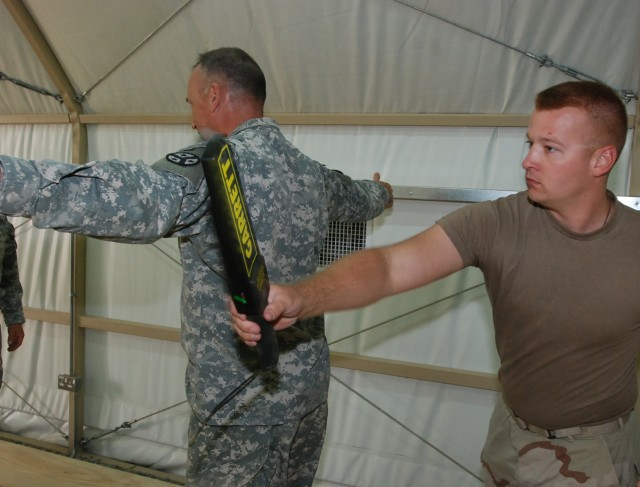
CAMP ARIFJAN, Kuwait (Army News Service, July 12, 2010) -- Soldiers, Marines, Sailors and Airmen look forward to going home on R&R and redeployment from various locations throughout the Middle East but would rather avoid the 100-percent 'baggage dump' required for customs inspections.
That process is now being streamlined thanks to new body and baggage scanner systems at Camp Virginia and Ali Al Salem in Kuwait. They cut customs times in half while maintaining security standards for the troops returning home.
The time troops spend in the customs holding area used to be five to six hours according to Navy Lt. Cmdr. Scott Wooden, commander, Company B, Navy Expeditionary Logistics Support Group Forward. The new scanners have reduced that time to between two and three hours.
The scanner performs the workload equivalent of 15 to 20 customs inspectors.
"By leveraging technology and modernizing our procedures, we were able to meet regulatory requirements while concurrently taking care of our redeploying troops and civilians," said Lt. Col. James Mullen, Third Army provost marshal.
"Our goal is to minimize the amount of time and pain required to go through customs," added Wooden.
Until recently, 100 percent of troops returning to the United States. would carry up to four bags, consisting of a duffel bag in each hand, ruck sack on the back and a small carry-on bag, to a customs inspector who directed them to dump each bag on a table. The inspector then searched through the contents looking for prohibited items before the Soldier carried the belongings in a plastic container to a separate table to repack the bags.
The scanners, which use the same X-ray technology used at airports worldwide, can detect knives and other metallic objects prohibited on flights.
On July 3, the first group of Soldiers experienced the enhanced customs process with the new scanner system at Camp Virginia before returning home.
"It was a lot easier...to just walk through...they scanned everything, they scanned us," said Sgt. Alana Coleman of the Mississippi National Guard. "It wasn't as time-consuming."
The 1st Theater Sustainment Command, which oversees the redeployment and R&R process, created the passenger-processing site at Camp Virginia to supplement the main site at Ali Al Salem. The majority of troops still process through Ali Al Salem, which began using the scanners June 25.
"Compared to February when I came through for R&R, the customs process takes a fraction of the time, is painless and extremely more efficient," said Capt. Gabriela Arraiz, postal officer for 912th Human Resource Company. "I no longer dread having to fly out of there."
More than 500,000 troops departed the Middle East through Kuwait in 2009 while either redeploying or returning for R&R. The processing sites can expect to see an increase in personnel flow in the upcoming weeks as troop numbers in Iraq decrease to 50,000.
"No more dumping bags!" exclaimed an excited Soldier about the new scanner systems.
That's not entirely true. Between 10 to 20 percent of all personnel will still be asked to dump their belongings for a customs inspection which is a drastic reduction in effort and time.
"The speed that we can process passengers with this new technology is amazing," said Capt. Emil Ganim, Third Army, U.S. Army Central customs officer. "We owe it to the troops who put their lives on the line for their country to get them home as soon as possible."

Social Sharing